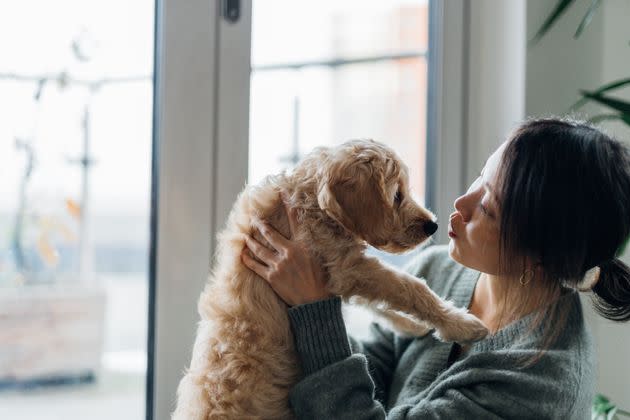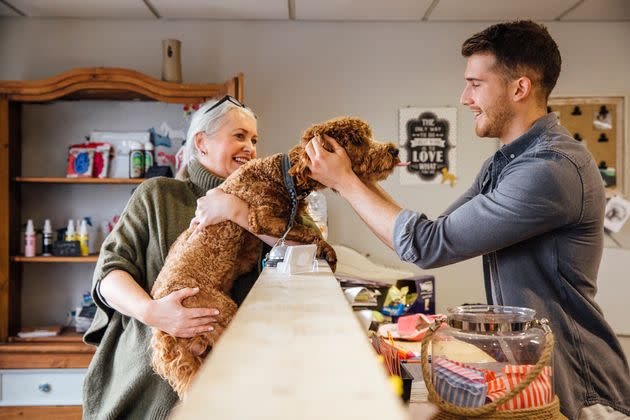The Rudest Things You Can Do With Other People's Pets

Don't make assumptions about other people's pets.
Most of us generally want to put our best foot forward when we’re interacting with other people. But we should keep the same ethos in mind with other people’s pets as well.
Rude behavior toward someone else’s pet may not only lead to conflict with that person ― it can also be a safety risk.
To help make pet interactions safe and enjoyable for everyone, HuffPost asked etiquette experts to share the faux pas they’ve observed ― and their advice for avoiding these missteps.
Touching Someone’s Pet Without Permission
“Polite people always ask before touching someone else’s pet,” said Jodi R.R. Smith, the president of Mannersmith Etiquette Consulting. “And polite people listen to what the owner asks.”
Seek permission from the owner before you approach and pet their animal. They might have a good reason to say no.
“It’s not only common courtesy but also an issue of safety,” said Tami Claytor, the etiquette coach behind Always Appropriate Image & Etiquette Consulting. “Not all dogs are friendly. Even tiny purse puppies nip or even bite.”
Not Consulting With Their Human Before Feeding Them
“Ask before feeding anyone’s pet treats or people food,” said Diane Gottsman, the author of “Modern Etiquette for a Better Life” and founder of The Protocol School of Texas.
Not every pet owner wants to give their animal a treat or special food at the time you’re interacting with them. If it’s a puppy, for instance, you might mess with their training. You also don’t know if they have any food sensitivities.
“Besides illnesses, some animals have palates as well and their palates have become accustomed to certain foods,” said Jackie Vernon-Thompson, the founder of From the Inside-Out School of Etiquette. “It is not your place, as a stranger, to attempt to feed someone’s pet any type of food, regardless of how sweet you think you are.”
Making Critical Or Disparaging Remarks
“Don’t make disparaging remarks about someone’s pet,” Claytor said. “It’s fine if you don’t ‘like’ or ‘love’ pets. However, you should never criticize someone’s choices. For example, saying to a pet parent ‘I don’t like dogs because they smell’ is rude.”
Also refrain from making critical statements about the particularities of someone else’s pet.
“Just like with humans, commenting on a pet’s weight is rude,” said Nick Leighton, etiquette expert and host of the weekly etiquette podcast “Were You Raised by Wolves?”
Giving Unsolicited Advice
“Don’t give unsolicited advice about a pet’s behavior, medical condition or quirks,” Gottsman said.
If the pet parents want your opinion or insights, they will ask you.
Not Supervising Your Children With The Animal
If your small child is interested in someone’s pet, be sure to supervise the situation and instruct them on how to interact safely.
“Teach children the proper etiquette is to ask the owner’s permission before playing with an animal,” Claytor said. “Also guide them to be gentle. Children can be too rough with pets and cause injury to the animal.”
Giving The Pet Medication Without Permission
As with food, you should not just give someone else’s pet supplements or medicine before consulting with their human.
“Never give another person’s pet medication, vitamins or CBD oil without prior approval from the owner,” Gottsman said.
Forcing Your Own Pet On Them
“When walking your dog, never feel it is OK to lead your pet over to another pet that is being walked,” Vernon-Thompson said. “It doesn’t matter if your pet is calm and friendly — the other person’s pet may not be as calm or friendly, and may respond in a very aggressive and sometimes harmful manner.”
Instead, leave enough space between the pets and try to communicate with the other owner if there seems to be mutual interest in interacting.

Always ask the pet's owner for permission to touch or feed their animal.
Making False Assumptions
“Pets, like people, have their own personalities,” Smith said. “Do not presume how someone else’s pet will react or interact with you. Take care in reaching down quickly to tussle the hair on their head, as your movement may be perceived as aggressive and the pet may nip or scratch you. Not every pet wants a vigorous back rub.”
Pets send different signals to indicate how they’re feeling. Let them approach you and try to stay within their field of vision when you first interact.
“Be mindful of your body language and theirs,” Leighton said. “For example, a wagging tail doesn’t always indicate happiness.”
Asking How Much The Owner Paid For Their Pet
“Don’t ask people how much they paid for their pet,” Claytor said. “The cost of a pet is personal. It’s akin to asking someone his or her salary, how much he or she paid for his or her home, car, handbag, etc.”
If you want to know the cost because you’re considering a similar pet, do your research online or let them offer that information when you express your interest in the process.
Demanding Unreasonable Accommodation
If you are visiting the home of someone with a pet, Gottsman advised against asking your host to crate their animal.
“They are part of the family, and you are the guest,” she said.
Of course, you can have a reasonable discussion in advance of your visit if there are medical concerns.
“If you are allergic to pets, let the owner know before you arrive,” Claytor said. “This will avoid the awkwardness of asking for the pet to be kept in a different room during a visit.”
She similarly warned against taking over the pet’s favorite area.
“The guideline to keep in mind when visiting someone with a pet is that you are entering the animal’s personal space,” Claytor said. “Its personality and preferences should be kept in mind. By violating a pet’s personal space, it could become aggressive or stressed.”
Endangering The Animal
Avoid behaviors that could be physically harmful to the pet.
“Don’t smoke around birds — nicotine is poisonous to birds,” Claytor said. “When lifting a dog, don’t pick it up by its front legs, as this can cause injury to the animal. For small dogs, the correct technique is to place the dog on your arm with one hand on its chest and use the other hand to support its legs.”
Taking Photos Or Videos Without Permission
“Don’t photograph or film a pet without permission,” Leighton said.
Many owners will probably be fine with you snapping a picture of their beloved pet, but the polite thing to do is ask beforehand.
Trying To Play With A Service Dog
“Never pet or play with a service dog,” Claytor said. “These dogs are trained to assist people who are blind or visually impaired. Remember, they are working animals and your interactions with them will be a distraction, which can endanger the person the dog is assisting.”
It’s best to only interact with these pets if their owner expressly invites you to.

